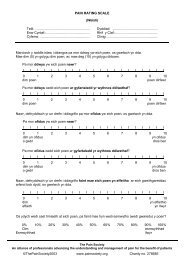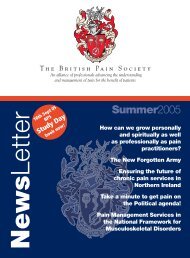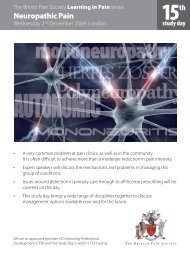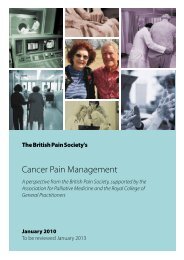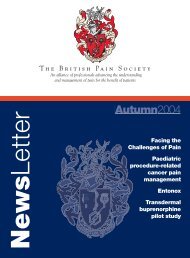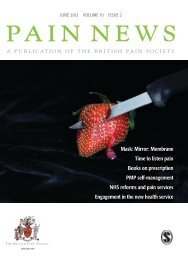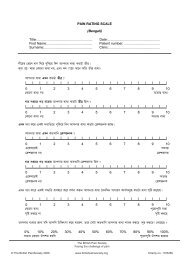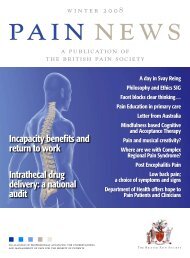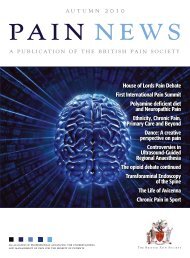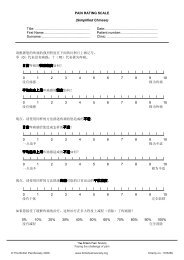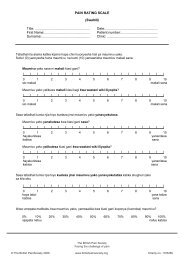Summer 2010 - The British Pain Society
Summer 2010 - The British Pain Society
Summer 2010 - The British Pain Society
Create successful ePaper yourself
Turn your PDF publications into a flip-book with our unique Google optimized e-Paper software.
ecame squalid and violent. Opium<br />
was prohibited in many countries<br />
during the early twentieth century,<br />
leading to the modern pattern of<br />
opium production as a precursor<br />
for illegal recreational drugs or<br />
tightly regulated legal prescription<br />
drugs. Further International<br />
regulation took place in 1961 and<br />
1988. Illicit opium production, now<br />
dominated by Afghanistan, has<br />
increased steadily in recent years<br />
to over 6600 tons yearly, nearly<br />
one-fifth the level of production in<br />
1906 despite the efforts of many<br />
to limit it.<br />
<strong>The</strong> right to analgesia, like opium,<br />
is a sensitive and charged issue<br />
and for many there are no easy<br />
answers. It is so sensitive that the<br />
pain faculty of ANZCA produced<br />
a document of rights and<br />
responsibilities, PS45, that has an<br />
addendum that states – “A “right<br />
to pain relief” does not imply that<br />
all pain can or will be treated<br />
successfully, that all patients will<br />
be free from pain, or that any<br />
analgesic treatment will necessarily<br />
be provided on demand, including<br />
the prescription of opioids. That<br />
right requires that the professional<br />
response be reasonable and<br />
proportionate to the level and<br />
character of the pain experience<br />
and that the assessment and<br />
management of a patient’s pain<br />
be appropriate to that patient”.<br />
Are we to dream like the American<br />
<strong>Pain</strong> <strong>Society</strong> that we can alleviate<br />
pain? If we cannot alleviate it, can<br />
we therefore say, however noble,<br />
that pain relief is a human right?<br />
Will the dumbing down of this<br />
sentiment and just cause lead to<br />
the medical nihilism of yesteryear<br />
when many chronic pain patients<br />
were just ignored and passed off<br />
as “malingerers” or “depressed”,<br />
and given an even lower priority.<br />
<strong>The</strong> clinical difficulties of managing<br />
a pain to total alleviation may<br />
inadvertently lead to the use of<br />
opiates as a last resort. This is just<br />
as wrong as failure to use them<br />
as a first resort when it is obvious<br />
that they are both efficacious and<br />
necessary. Once again we still<br />
have many unanswered questions<br />
and we work in a system where<br />
long-term, non pharmaceutically<br />
sponsored, clinical based research<br />
is both impossible financially and<br />
technically and ethically difficult.<br />
Is it no wonder that the poor pain<br />
clinician, after years of just trying to<br />
improve his service on the back of<br />
arid support, gives up when faced<br />
with a 64 page ethics form and the<br />
competing interests of managerial<br />
targets and ever demanding<br />
patients. <strong>The</strong> research base has<br />
many unanswered questions<br />
and clinical judgement, rightly<br />
or wrongly, has less clout than<br />
previously. When was the last time<br />
you heard a patient with a chronic<br />
headache or severe rheumatoid<br />
pain declare a persistent clinical<br />
transformation on the back of<br />
sustained release opiates? We still<br />
have to make difficult and uncertain<br />
decisions. In 1996 the Drug and<br />
Alcohol Unit in New South Wales<br />
reviewed the official records<br />
of opiate prescribing for non<br />
malignant pain in Australia from<br />
1986-1996. Even then there were<br />
concerns of dose escalation and the<br />
use of “opiates in poorly defined<br />
medical problem in patients<br />
where the presence of social and<br />
emotional problems was noted”.<br />
<strong>The</strong> “quality and thoroughness of<br />
medical information documented<br />
in the health department files was<br />
very limited”. This is in country, that<br />
in the early 1990's and beyond,<br />
where every time a potent opiate<br />
is prescribed for anything but<br />
palliative care, the local health<br />
authority has to be notified. As<br />
well as this regular auditing of<br />
these patients took place. Is it not<br />
time that, in response to these<br />
concerns we attempt something<br />
similar in the UK? A comprehensive<br />
multicentre audit at least. <strong>The</strong>n we<br />
can get an idea of both good and<br />
bad practice out there.<br />
To quote an IASP clinical update<br />
the "marked change in prescribing<br />
habits, related in large part to<br />
the advent of “designer” opioids<br />
(new long-acting formulations)<br />
producing heightened commercial<br />
interest and to the increasingly<br />
active sponsoring of pain advocacy<br />
by the pharmaceutical industry”<br />
has not produced a new dawn.<br />
Neither will opiophobia. We need<br />
an open debate, we need more<br />
evidence and as pain physicians<br />
we need to admit when we are<br />
faced with intractable clinical issues.<br />
Intractable pain problems have not<br />
and should not be an open door to<br />
potent medications otherwise pain<br />
clinicians may lead all, patients,<br />
medical staff and pharmaceutical<br />
companies to an “empire of dirt”<br />
and that would be to no ones<br />
benefit. Dr Cathy Stannard hosted<br />
an excellent seminar at the ASM in<br />
Manchester where some of these<br />
difficulties were aired. We have an<br />
excellent document that has just<br />
been produced. We are publishing<br />
an excellent document on cancer<br />
pain. It is up to us to help to “find a<br />
way”. It will not be easy but, as pain<br />
clinicians, it is both our challenge<br />
and our burden to both help and<br />
prevent “Hurt”.<br />
Mike Basler<br />
newsletter@britishpainsociety.org<br />
PAI N N E W S S U M M E R <strong>2010</strong> 5




